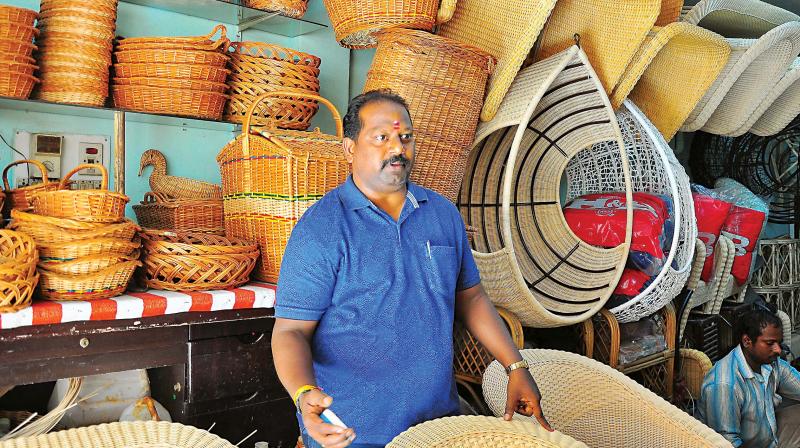Urban Legend: Bengaluru's cane craftsmen weave a woeful tale

Cane furniture was once a bustling industry, with a thriving cluster of shops around Shivajinagar. Today, however, the going is rough for cane craftsmen who are simply unable to keep up with the rapid pace of a consumer-driven economy. 40-year-old G. Venkatesh, who has been in the business for two decades, talks to Joyeeta Chakravorty about his journey, reminiscing over the days when crowds thronged their stores, to today’s dwindling demand, the lack of government support and how crafstmen like himself struggle to make ends meet.
Tucked away in busy Thippasandra, it is barely noticeable in all the hustle, bustle of the locality. On entering Sri Vijayalakshmi Cane Furniture, a modest shop, that first opened 25 years ago, it seems like just another home decor store in the city, but to the ecologically sensitive or those with an eye for interior design, it holds great promise as it is visibly trying to stand apart in a heavily consumerist environment, shrouded in profit -making.
For 40-year-old G. Venkatesh, who has been running the shop for the past two decades and more, it is more than a business. "I started this shop as a cane craftsman and I myself made all the furniture. Even today it is not merely a business for me. If you look around there is nothing fancy here and no big boards," he says. He is right. The glass top cane desk has some really beautiful furniture and home decor designs on it and the walls are adorned with posters of various gods. But there is little by way of pomp or ostentation. The simplicity is stark.
The journey, despite being tough has been enriching for the entrepreneur, who has made many loyal customers along the way. But the days are hard and the seven craftsmen that once served his shop have now fallen to merely two.
"People from North India, Kerala and foreigners really like our products. In the West there is a demand for handmade products. But sadly, there is not much appreciation for handmade craftsmanship in the city," he regrets, pointing to a chair, which a Taiwanese customer had sent for repolishing and various touch- ups.
In fact, many of his customers have walked in with complaints of some chair or piece of furniture they had bought being damaged in a few days. "This happens because everyone is into profit- making and the sensitivity towards craftsmanship and products is lacking nowadays. But people like big names and stores in fancy malls ,and it is hard to break this chain of thought," he sighs.
But doesn’t he sell some of his stuff to these big shops and stores? "No! I don't think on these lines. I do everything in my shop from manufacturing to sales," he responds, adding, “Sadly, the industry is not big anymore. Remember the times when there was a multitude of cane shops in Shivajinagar market? But now you only see one or two of them."
"My journey started with the sole idea of making cane furniture with the best craftsmanship available and back then it used to be a profitable industry. But now it is more like creating a livelihood for my fellow craftsman and myself," he confesses, while attending to a customer.
Week-days are mostly slow and he makes most of his sales on the weekends. "Ninety per cent of those who come to me are chain customers and so luckily I don’t need to rely on advertising like other big stores in the city,” he adds.
Reflecting on the challenges facing a cane craftsman he says, "There is minimal support from the government, be it in reduction of taxes or availability of raw material. Why can't our state help us?" he asks, explaining, "It is difficult to procure cane, although it is readily available in the forests. The authorities can help us with this as it would help this local industry flourish. But no one is listening. Also, after all this hard work we are taxed immensely. Post the Goods and Services Tax (GST) it has become more difficult as the customer does not understand the work that we put in anyway.”
In the absence of bulk manufacturing, the GST is hard to deal with for stores like his. “At least the tax burden for small shops like ours should be reduced or we can be helped with the supply of cane and other raw material. It would be an incentive," he says. Besides being good for the environment, cane is also good for health as it does not generate heat like other material used in making furniture, he points out.”People should value this, but sadly, it is more about pomp and show now," he sums up sadly.

